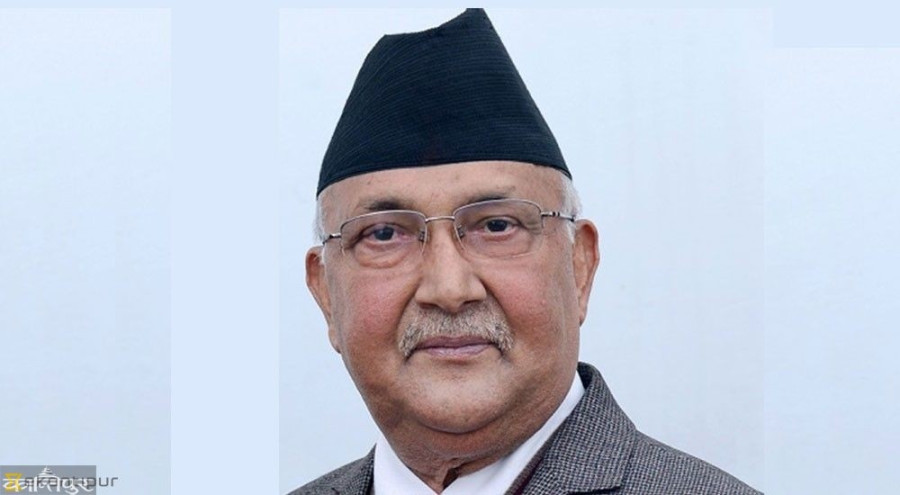National
As Oli prepares to visit Cambodia and Vietnam, questions are being asked—why?
Foreign policy experts and a section of leaders, however, have expressed concerns over Oli’s upcoming visits to the Southeast Asian nations, saying that Nepal neither has much diplomatic engagement nor significant interactions in terms of trade and investments with them.
Anil Giri
Prime Minister KP Sharma Oli is visiting Vietnam and Cambodia from May 9 to 15.
Foreign policy experts and a section of leaders, however, have expressed concerns over Oli’s upcoming visits to the Southeast Asian nations, saying that Nepal neither has much diplomatic engagement nor significant interactions in terms of trade and investments with them.
According to them, the visits also contradict the government-announced policy of financial austerity to lessen the burden on state coffers.
“I do not see any reason why the prime minister is visiting these two nations,” Nishchal Nath Pandey, director of the South Asian Studies and an expert on foreign affairs, told the Post. “Both Cambodia and Vietnam are on the international radar for being illiberal democracies where there is a lack of freedom.”
Announcing the prime minister’s visit to the two Southeast Asian nations, Foreign Minister Pradeep Gyawali told the media on Thursday that “it is a high-level visit taking place after a long time at the invitation of Vietnamese Prime Minister Nguyễn Xuân Phúc where the prime minister will get an opportunity to study how development is taking place.”
Oli will be accompanied by some lawmakers, including from the opposition Nepali Congress. A bilateral consultative mechanism between the two countries will be established and issues related to visa fee waiver signed with the respective government officials and diplomats during the visits, according to the Ministry of Foreign Affairs.
“In the last 30 years, the way Vietnam has progressed, the way it has attracted investment and the way it has risen as an economic powerhouse from the devastating war… we can learn a lot from the country,” said Gyawali.
Oli will also attend the UN Vesak Day, which will be observed from May 12 to 14, in Vietnam, according to the Foreign Ministry.
Former foreign secretary Madhu Raman Acharya said the Oli government instead should have focused on plans to organise a Buddhist summit in Nepal and attract tourists from Buddhist countries like Vietnam. “Once we had organised a Buddhist summit. Why should not we organise it again? We are the country of Buddha’s birthplace,” Acharya told the Post. “Nepal should organise a Buddhist summit to attract Buddhist pilgrims from all over the world.”
After completing his Vietnam visit, Oli will fly to Cambodia where he will meet Cambodian Prime Minister Hun Sen who had visited Nepal during the controversial Asia Pacific Summit in Kathmandu last year.
Some bilateral agreements are likely to be signed between Nepal and Cambodia during the visit.
The main opposition Nepali Congress has expressed concerns over Oli’s visit to countries like Cambodia, saying it wonders whether he wants to learn a lesson or two from the political system the country practises.
Former foreign minister Prakash Sharan Mahat, who is also a joint-secretary of the Nepali Congress, said: “The nature of communists across the globe is the same. They prefer a one-party system and want to rule in an authoritarian way.”
“Nonetheless, I am not surprised much. Though our communists have risen to power through democratic exercise, they seem to be heading towards the same authoritarian system like in Cambodia,” Mahat told the Post.
Oli, who took office in February last year, has met with criticism in recent months for his bids to centralise power and curb dissent.
Since the Oli government enjoys nearly a two-thirds majority in Parliament, critics say it has often been involved in pushing its way through, ignoring broader consultations and democratic principles.
The Asia Pacific Summit in Kathmandu, hosted by the Oli government, had also met with a lot of criticism, with many even questioning the invitation to the Cambodian Prime Minister Hun Sen.
Hun Sen, who has been in power since 1985 and is one of the longest-serving prime ministers in the world, is credited with an impressive economic growth but he faces international criticism for ruling the country in an authoritarian way, curbing dissent and maintaining a poor human rights record.
Oli received the invitation to visit Cambodia from Hun Sen while he came to Kathmandu for the Asia Pacific Summit.
“Cambodia has achieved high economic growth after peace before which the Khmer Rouge regime had caused devastation. It has done pretty well mainly in the field of tourism,” Gyawali told the media. “We want to attract tourists from Cambodia too.”
Experts, however, say the prime minister should set his priorities right when it comes to foreign visits and he should visit those countries from where the chances of maximising benefits are high. In September last year, Oli had visited Costa Rica, inviting criticism.
Since assuming office, Oli has also visited Switzerland besides India and China.
“There have never been high-level visits from Nepal to these two South East Asian countries. We have not been able to conduct important bilateral engagements with some countries because we have not had high-level visits from Nepal in recent times,” said Pandey.
“A visit to Bangladesh rather would have been more fruitful, say, in terms of energy connectivity. There has been no visit to Moscow in more than a decade. Instead, we have chosen these two countries for the prime minister’s visit where we do not even have our embassies.”




 9.83°C Kathmandu
9.83°C Kathmandu














